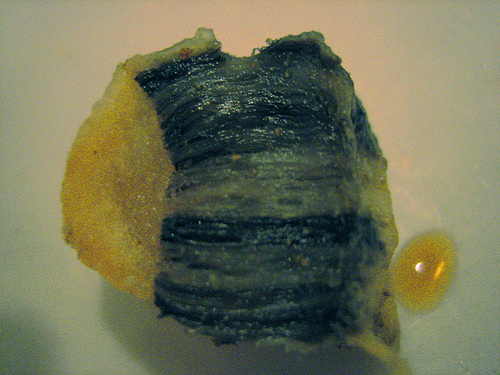What if I told you that if you have high cholesterol and you're overweight, one of the best ways for you to lower your cholesterol levels, and specifically your LDL (bad) cholesterol levels is to switch to a low carbohydrate diet and plan your meals so that the majority of your calories come from fats and proteins? What if I told you that you can eat steaks, hamburgers, brats, bacon, pork chops, fish, nuts, cheese and similar foods, and that your cholesterol levels would go down to a healthier level and you would lose weight more easily? This seems to fly in the face of everything we've been taught about nutrition, but it's true.
It's well documented that a low carbohydrate diet high in fats and proteins will improve your cholesterol levels and presumably reduce your risk of heart disease and heart attack. It will also help you lose weight. Don't believe me? Read this: http://www.nutritionandmetabolism.com/content/4/1/23
A direct quote:
"Low carbohydrate diets (LCD) are associated with a fat intake percentage that typically exceeds orthodox recommendations. LCDs represent a way to reduce caloric intake, promote weight loss, and reduce the atherogenicity of the plasma lipid profile. The meta-analysis of studies between January 1, 1980 and February 28, 2005 by Nordmann et al [6] demonstrated that relative to low-fat energy restricted diets, LCDs have a better efficacy for weight loss promotion and improved plasma lipid profiles than low-fat diets during the first six months of administration [6]. LCDs have been demonstrated to lead to significant improvements in the plasma lipid profile and, presumably, CHD risk [7-10]. The benefits of LCDs on the lipid profile have been shown to occur independently of weight loss [9,11]."
But... Why?
Well here is how this works, in a somewhat simplified manner. Let's start with a person, man or woman doesn't matter, age 35 who is overweight. Let's say they need to lose 50 pounds to get to something resembling a healthy weight. This person probably has elevated blood pressure, elevated cholesterol, and is working on a start to diabetes with some measurable insulin resistance. Now this doesn't mean that our test subject is going to drop dead next week, but he/she is clearly not on a path to live a long, healthy, active life.
A typical meal for our test subject, who we will call Kelly, probably consists of something like a cheeseburger and fries, or perhaps something really carby like spaghetti and garlic bread. Kelly is hungry, Kelly eats a filling meal. Because of the high carbohydrate levels in the potatoes, bun, noodles and bread, shortly after eating, Kelly's blood sugar spikes. As we know, most of the carbohydrates in a western diet are easily and quickly converted to glucose. Kelly's body reacts to this large amount of fuel in the blood stream by storing some of it as fat. At about this same time, Kelly's pancreas dumps a large amount of insulin to deal with this spike of glucose in the bloodstream. Over a short amount of time, perhaps an hour, Kelly's blood sugar starts to drop, and then as insulin levels spike, blood sugar crashes. Insulin levels spike higher than they need to because Kelly is somewhat insulin resistant. Around this time, Kelly's blood has very little glucose for cellular energy, making her feel tired. At the same time, the high insulin levels are actually preventing her body from burning her own fat for energy. That's one of the things that insulin does. After the blood sugar crashes, while insulin levels are high, Kelly starts to feel hungry again. It's only been maybe 2 hours since eating a nice 1500 calorie dinner, and our friend Kelly is already hungry. Well not really, but Kelly's body thinks so. So, Kelly eats a snack, adding another 300 calories to the total for the day. Blood sugar spikes again, and the whole process repeats itself. The high carbohydrate diet has short-circuited Kelly's body process, it simply wasn't designed to eat these kinds of foods.
It's pretty easy to see why a person in the above situation would have a hard time losing weight. To add insult to injury, such a person has also done nothing to improve their insulin resistant state and are working on developing diabetes.
Is it as simple as reducing carbohydrates in the diet? Pretty much, yes. A low carbohydrate diet forces the body to use fat for energy instead of glucose, often putting the body into a state called ketosis. In ketosis, the body converts fats to various types of ketone bodies, which the body uses for energy. There is no glucose/insulin roller coaster at all. Not all low carbohydrate diets will induce ketosis, but even without ketosis, the benefits of low carb diets will make it easier to eat less, and without the insulin spikes will allow the body to burn more of its own fat stores for energy. Combine this with the documented benefits of improving cholesterol levels, such a person would be well on their way to improving their overall health.
If this seems at all unnatural to you, think back to our pre-industrialized Inuit population, a people who spend their entire lives in a state of ketosis. A people who traditionally had a near zero incidence of diabetes and heart disease, all while getting most (~75%) of their calories from fat.
 |
| Whale blubber - pure fat and a staple of the traditional Inuit diet. |
So where does this leave us? Many have suggested a new food pyramid, and it's not just those who use ketogenic diets for weight loss, it also includes many doctors, nutritionists, and scientists who believe that a low carb diet is healthier overall. In Part 4, we will talk about that nutrition plan and just how to make it happen.
No comments:
Post a Comment